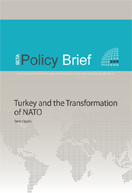Recent years have made it clear that NATO is going through a transformation process; Turkey will be one of the allies most affected by this process. Both the future of NATO and Turkey’s perception of NATO membership will be at stake unless the allies can reach consensus on the core strategic issues of the transformation agenda. Analysts urgently need to come up with convincing answers to the following questions: In which ways has NATO’s transformation been going through? Why does Turkey feel uneasy with some aspects of the process? What steps should Turkey take in order to ensure that the transformation of the Alliance is viewed positively at home?
As recent years have demonstrated, doubts over NATO’s credibility have been on the rise in Turkey. Critical questions in this regard involve the ways in which NATO’s transformation is being handled; the reasons why Turkey has begun to feel uneasy with some aspects of this process; and the consideration of what Turkey can and should do to ensure that the transformation of the alliance is viewed positively at home. Both the future of NATO and Turkey’s perception of membership will be at stake unless the allies can reach consensus on the core strategic issues of the transformation agenda, such as threat definitions, the enlargement process, the war in Afghanistan, NATO’s role in the Black Sea region, NATO’s relations with Russia, EU-NATO cooperation, the installment of missile defense shields in central and eastern Europe, and so on. As the transformation struggles forward, Turkey will be too valuable an ally to lose, given the fact that the specter of civilizational clashes has increased dramatically in the post-9/11 era. In the process leading to the election of the new Secretary General, Turkey played a key role in strengthening the point that the personality of the Secretary General would not only affect the end result of the war in Afghanistan but also the image of the alliance across the Islamic world. Turkey’s input and involvement in NATO in the new era is vital: key factors in ensuring its continuance include understanding how best to handle the transformation process and what Turkey can do to manage the transformation strategically.
A short history of NATO’s transformation Even though the initial raison d’être of NATO was to help secure the territorial integrity of its members against the Soviet threat, the alliance performed other functions as well. NATO symbolized the togetherness of the nations that embrace liberal-democratic norms at home and abroad; it helped legitimize the presence of the United States as a security actor in Europe, and it served to put Germany down so that it could never again pose a serious challenge to security in western Europe. NATO has long offered a security blanket under which European allies could intensify their supranational integration process and turn the EU into a Kantian security community. And following the evaporation of the Soviet threat, the alliance has continued to preserve its relevance. During this process, the number of members has increased to 28, and the alliance has adopted new strategic concepts and missions. NATO as the ‘European collective defense organization’ has gradually transformed itself into the ‘global collective security organization’ performing military and political functions simultaneously.
As the strategic documents adopted in 1991 and 1999 demonstrate, in addition to its traditional Article-5 missions, NATO has increasingly adopted non-Article-5 missions, such as intervening in intra-state conflicts, doing crisis-management activities, aiding o










